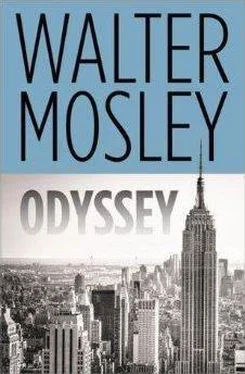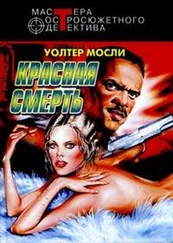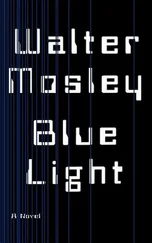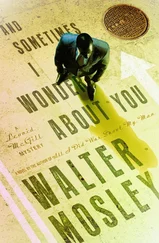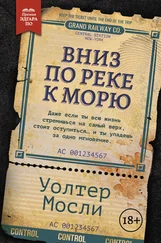“Oh, yes,” Winifred James said. But she didn’t let go. “Yes, we should give him some a’ that hard lemonade you made.”
Sovereign stood there with his frail mother in his arms. It was an odd feeling, a solitary incident that was out of the range of any experience he had known.
“Mama,” Eddie said, and she raised her head from Sovy’s jaw. “Mama, come on in the dining room and we’ll all sit down and talk.”
While saying these words Drum-Eddie took his mother by the hand, disentangled her from Sovereign, and led her from the unfinished room into the interior of the apartment.
“Sit down and talk,” she said, repeating the words gratefully.
The dining room was a shock.
It was a comparable size to the dining room they had in the cylindrical San Diego home. It was laid out with the same furniture, and even the carpet looked similar to the one Sovereign and Drum rolled on as children.
“Mama took everything from the old house and brought it out here,” Eddie said in answer to the bewilderment on Sovereign’s face. “She wanted to be back home in South Carolina, but she didn’t want to leave our San Diego place either.”
Zenith, now older, even more stern-looking than she had been as a precocious child, helped Eddie settle Winifred in the chair she had sat in at every meal that Sovereign could remember.
“Go on to your seat, Sovy — I mean Sovereign,” Zenith said.
The children seated themselves around their mother, leaving a chair empty for Solar James, who had been dead for sixteen years. There was also an empty place for Eagle James’s wheelchair, and a guest seat that was rarely used.
With everyone seated a pall of early-morning silence fell over the long-lost family. It dawned on Sovereign that for the first time in many days the expectation of state retribution for his brutal attack on Lemuel Johnson had fallen away — completely. The people he had known best and longest were seated around him in a space displaced by thousands of miles.
An amber-colored woman of middle age strode into the room just before Sovereign was about to ask why they were sitting so passively. She was a chubby woman who looked to be strong. Her garrulous smile showed off one gold-capped tooth.
“Hello, Mr. Sovereign,” the short bundle of strength and ebullience exclaimed. “I’m Mary Klay and I work for your mother when she needs it.”
“Are we related?” Sovereign asked as the woman stopped maybe a foot from his chair.
“Heavens, no, my love. The Handlys are the oldest family around here. They have people working for them.”
While Sovereign tried to tease out the logic of deep roots and wealth, Mary Klay asked the assembled family, “Pancakes or hash scramble for breakfast?”
“Can we have both, Aunt Mary?” Eddie said.
“Of course you can, Mr. Drum-Eddie. Of course you can.”
A jagged twitch of energy crossed the inside of Sovereign’s chest. He understood that this was jealousy, that his family had gone on without him, eating off the same table and bringing new members into the fold.
What had he been doing all those years when Christmases and Thanksgivings were celebrated and he was in the apartment plotting revolution like a child playing with tiny dark green plastic soldiers?
“Sovereign?” Winifred Handly-James said.
“Yes, Mama?”
“Are you in trouble, son?”
“I am,” he said. “I mean, I am, but maybe not in the way people are saying.”
The old woman’s face was doll-size but not rigid. Her eyes seemed to change with each idea he espoused.
“I mean, there’s a man I beat terribly. I went blind there for a couple of months.”
“That must have been awful,” Winifred uttered softly but clearly.
“You would have thought so, Mama, but really it made me understand so much. You know there’s people runnin’ around with eyes wide open but seeing only what they think they see.”
“Oh, baby,” Winifred said, “don’t you know it. The older I get the more people look like those that I knew a long, long time ago. And it’s so crazy, because I know it’s not the same people, but I feel for them the same way I did the people they look like from forty, fifty years ago. I met this one man in the store in downtown Pomegranateville and invited him to dinner because he looked so much like Lucius Lowery, a man I knew before I met your father. We was halfway through the meal before I realized that I couldn’t get the right words out of him.”
The food came then, brought in on platters by two adolescent boys, both of them dark brown and deferential.
The scramble was hash browns mixed in with eggs, onions, bacon, and a homemade sausage of some kind. The pancakes were whole-wheat with strawberries and real maple syrup. They were all served with a beverage made of chicory and coffee, and fresh-squeezed orange juice.
When they started eating, Eddie began regaling them with stories from their childhood — a childhood experienced in that very room, albeit in another town and state. When Zenith laughed at the stories, Sovereign remembered that she had always been partial to his younger brother, from afar at least. He hadn’t been fully conscious of this as a child. When he was young, Eddie was his best friend, not hers. That was what his philosophy professors would have called an ontological fact — as reliable as the existence of the Pacific Ocean or the phases of the moon.
Eddie reeled out one memory after another while the serving boys, under the watchful eye of Mary Klay, kept food on their plates. Zenith laughed and nodded, while Winifred’s eyes kept drifting back to Sovereign, who neither ate nor drank but filled his eyes and ears with the long-ago that he was sure had been lost.
“... and, and, and,” Eddie was saying excitedly, “there was that time that Mr. Kurisawa from next door told Dad that the cherry tree marked the line between our properties.”
“I remember that,” Sovereign said. His voice sound odd in his mouth. It didn’t sound to him like who he should have been in that conversation. He was supposed to be younger, more excited.
“What do you remember, Sovy... I... I... I mean Sovereign?” Zenith asked.
The question made Sovereign realize that he had frozen in the middle of his interruption. He was just saying that he remembered Mr. Kurisawa and the feud between Solar and the oldest resident of their neighborhood.
Both men honestly believed that the tree proved his property line, but each felt that the far side of the tree from his property was the marker. Each man hankered to put up a fence to prove his claim, but every time one of them made the attempt the other would come out yelling and cursing.
They argued and fought for more than a year before Mr. Kurisawa called Solar James over for a drink one afternoon. Winifred was afraid that the men would kill each other, but after two hours Solar came back and said that the men agreed to hire a land surveyor to come over and mark out both property lines. The man who was proven wrong would have to pay the twenty-five-hundred-dollar fee.
Sovereign remembered the story but he didn’t speak it. This was because he had forgotten who had won the bet. The fence was never built...
“Sovereign?”
“Yes, Mama?”
“What’s wrong, baby?”
“I need to go outside for some air,” he replied.
He stood up from the table of his childhood and found the door that led to an external staircase.
Going outside he felt a definite sense of displacement. He was expecting the old yard with its Saint Augustine grass and slatted redwood fence across the back. Instead he found a patchy landscape of weeds and bare soil, a scattering of pine and dogwoods. There was no fence. The property just went on and on as if no one owned it. It was hot and muggy. Sovereign felt sweat forming on his brow and back.
Читать дальше
